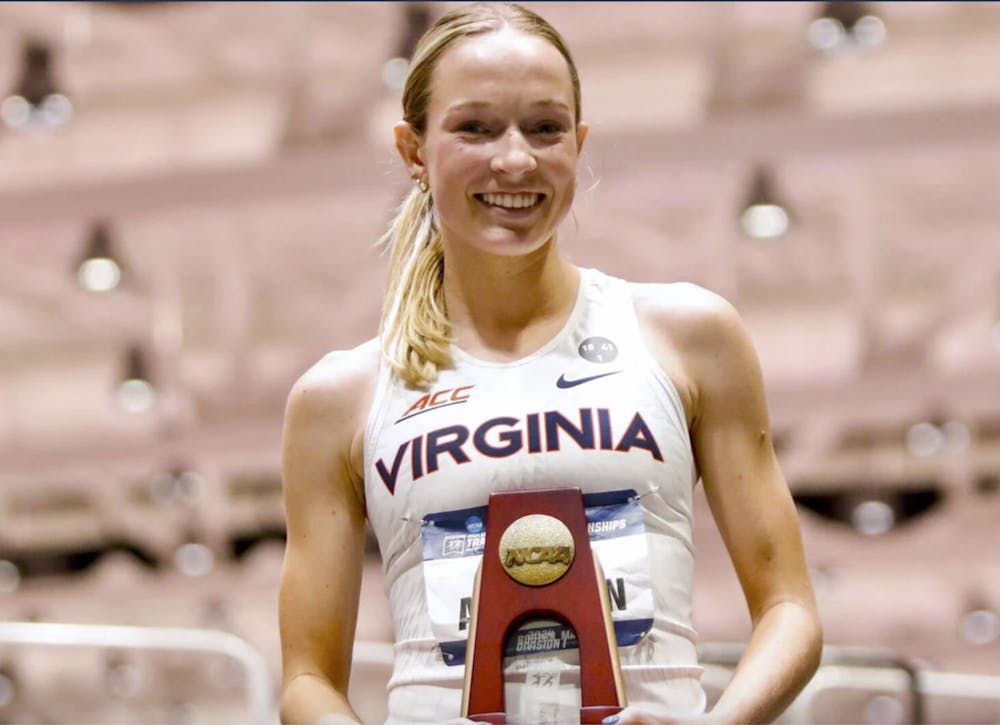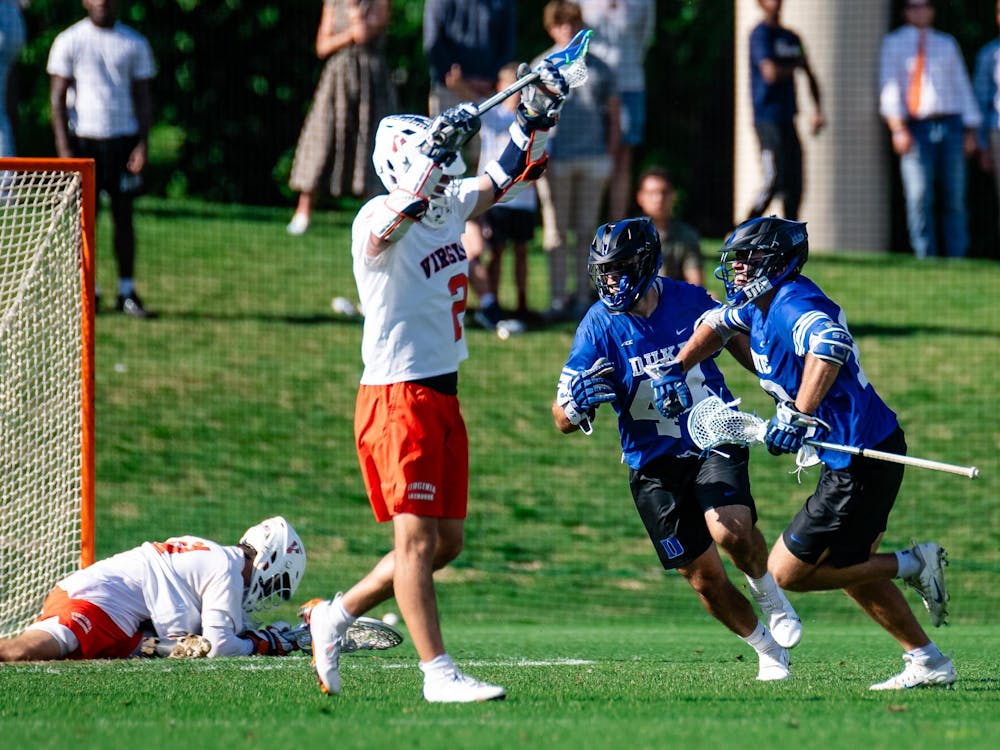One Friday in early March of 2023, then-sophomore runner Margot Appleton lined up for a race she had not expected to be in.
Only 16 runners can qualify to race in the NCAA 1 Mile preliminary, and Appleton was 22nd on that list. However, six people had scratched, and so she was called up to race. Appleton took to the track with nothing but a slim hope of making the top 10 and heading to the finals.
“I’m last. I’m not going to make it,” Appleton thought in the first half of the preliminary race, but in the eighth and final lap of the mile, she passed just enough people to nab the last qualifying spot for the final.
She headed back to the track the next day with an eagerness to race. Appleton knew that the top eight runners in the final would earn All-American honors, so she only had to beat two other people.
And she did just that. Appleton powered through a frenzied final lap and finished in fourth overall.
“It changed my whole outlook on myself as a runner and where I was at,” Appleton said. “And I think just the overall experience was so fun because there were no nerves going into it. It was just like, see what I can do.”
That race firmly entrenched Appleton’s status as one of the strongest collegiate runners in the 1,500 and mile. But the end of her tenancy atop those two races, with the outdoor NCAA Championships approaching in June, is on the horizon.
Appleton joined the program in 2021 and had some strong but not extremely notable performances. She was part of the seventh place Virginia distance medley relay at NCAA indoors and advanced to the NCAA East preliminary round in the 1,500.
Following her performance at NCAA indoors, later that year Appleton took third place in the 1,500 meters at the NCAA Outdoor Championships, and by the end of the next indoor season she held three Virginia records in the mile, 3,000 meters and the women’s distance medley relay.
Unfortunately, after an extended outdoor season in 2024 followed by a month or two of easier running, Appleton had the first major injury of her running career — achilles tendinitis. This forced her to take five weeks off running, keeping her from competing in the vast majority of the cross country season.
“I wasn't even sure if I was gonna run cross country,” Appleton said, “and definitely the first couple of workouts back from that I felt I [hadn’t] been this out of shape since high school.”
It was not until cross country ACCs in November of 2024 that Appleton returned to the field, placing seventh there and then taking fifth at NCAA Southeast Regionals. In spite of the lost time, both of Appleton’s finishes were on par with her 2023 cross country season. In fact, her efforts at the Southeast Regionals gained Virginia’s women their first automatic bid during Appleton’s time there.
At cross country NCAAs, she had her best finish ever, placing 18th in a competitive field — a significant jump from her 51st-place the year before and finishing the highest out of any other Virginia women’s runner in the race.
In indoor season, she broke her own Virginia record in the mile by four seconds, dropping it to 4:25.03. Her NCAA finish in the mile, though, was not as high as she had hoped. Still, Appleton was the only Virginia female athlete to qualify for indoor NCAAs this year.
“I didn't have a great race … at NCAA, and that really stunk, because I've never not performed [well] at an NCAA meet,” Appleton said. “And going into that race, I'd run a 4:25 mile, which should have been one of the top times going in.”
A couple weeks after that race, the team went to the Raleigh Relays, where Appleton then ran the fourth-fastest NCAA time ever in the women’s 1,500, taking three seconds off her personal best in the event.
To this point, Appleton has clearly compiled a magnificent career, clawing her way to become one of the NCAA’s very best. One might think that ascension comes with pressure, but for Appleton, a positive mindset overpowers the stress.
Approaching running with a positive mindset has been a key component of Appleton’s career, and she mentioned that the best piece of advice she received was from her high school coach, who told Appleton when she was taking her easy runs too fast that she needed to slow down and keep her easy days as a space for recovery. Appleton has continued to heed this advice in college, focusing on keeping running enjoyable rather than obsessing over the details.
Prioritizing recovery and focusing on the big picture rather than on every little detail has been something Appleton has also seen from some of the best runners she knows.
“A lot of female distance runners kind of hyperfixate on doing all the right things,” Appleton said. “...But I don't think [high-caliber runners are] hyperfixated on everything they're eating, or their paces on their runs, or what they do on the weekends as much … I think it's exhausting if you're constantly trying to do everything perfectly.”
Unlike many runners who focus on ultra-technical details, Appleton does not use a GPS watch to track mileage or pace on her runs, instead opting to run for a certain amount of time.
She also has a particular racing strategy, which has worked well for her in allowing her mind to relax during a race. Appleton typically starts her races slightly slower than her competitors and gradually moves up through the pack before kicking hard in the last lap — and delivering a final blow to her competition.
“I am super competitive,” Appleton said, “I don't like leading races, because I honestly find racing easier than doing a hard solo workout, because I love to just focus on the person in front of me, rather than time.”
She admitted, though, that this has been both a strength and a challenge.
“My natural tendency is to usually go to the back,” Appleton said, “and I've been trying to work on finding a happy medium with that, because that works when you're trying to get third or fourth in an NCAA final. But if you're really going for the win, you don't want to be in the back.”
On the subject of going for a win, Appleton has tangible goals for the conclusion of her final season with Virginia. She would like to win a wheel, a trophy particular to the Penn Relays, with her relay team and hopes to race — plus maybe take first — in the 1,500 at NCAAs.
“I don’t want to put crazy pressure on myself because it’s the 1,500, and the NCAA has been deeper and faster than it’s ever been, but I do want to go into that trying to win,” Appleton said.
Appleton was recruited because Virginia believed that she could be a contributor to this program and raise the standards for the Cavaliers. Needless to say, Appleton has proven to be that type of athlete many times over. Ahead of the final races, it is perfectly fitting that she continues to do things her way, just as she has always done.







